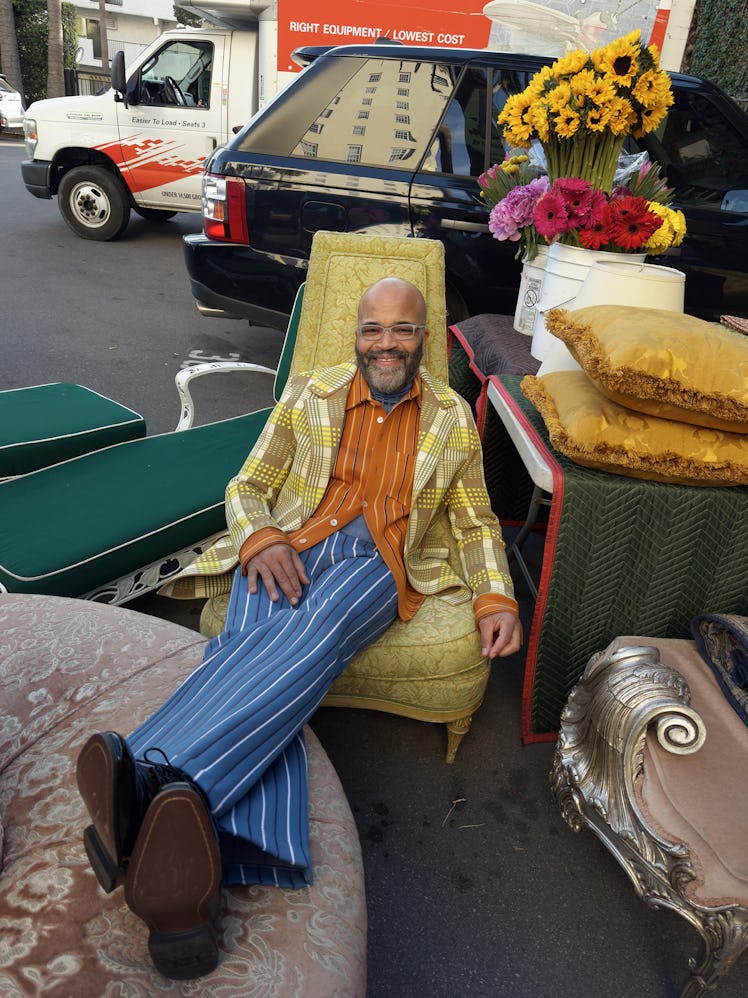How Jeffrey Wright Saw Himself in American Fiction

When Jeffrey Wright first received the script for American Fiction, screenwriter-director Cord Jefferson’s film based on the novel Erasure, by Percival Everett, there was a note attached from Jefferson. “He said that he’d been reading the character—Thelonious ‘Monk’ Ellison, the writer who's at the center of the film, in my voice from a very early phase in the process. He also said that he had no plan B, that he had done it with me in mind.” Luckily, the esteemed 58-year-old actor also saw himself in the role (for which he received a Golden Globe nomination for best actor). The film, which follows Wright’s Monk, a struggling author who jokingly pens a book filled with negative Black stereotypes that becomes a runaway hit, presents a sharp send-up of the literary establishment and its demands for writers of color. But it also offers, as Wright explains, a welcome perspective on the complex realities of family life.
How much did you identify with Monk when you were reading the script for American Fiction?
It felt like a second skin for me, this character and his journey, his relationship to love and family. Monk is in some ways extraordinary, but in other ways ordinary. His mother is ailing. He's called upon to be her caretaker, and that's a very challenging moment for someone in their life. I understood that dynamic and the sacrifices that it calls for in terms of professional and creative aspirations that fall to the wayside. So we see this family that is dysfunctional and functional, loving and as mad as anyone else's family in the world. It’s a family that happens to be populated by Black people, but it's a family just like anyone else's. There was something wonderful about that, and something I hadn't been asked to play before. I really relished playing with Tracee Ellis Ross and Sterling K. Brown and the legendary Leslie Uggams. We were on set and just reveling in it because we realized that it was pretty rare—even though ordinary, pretty rare.
Did you always want to be an actor?
I may have wanted to, but I didn’t admit it to myself. I didn’t start acting until my junior year of college. I was a political science major, so that’s a different type of theater. My first movie was called Jumpin’ at the Boneyard. The first significant thing that I booked was Separate but Equal, and Sidney Poitier played Thurgood Marshall, the Supreme Court justice. My first shot was opposite Sidney Poitier, and I had no clue what I was doing.
Do you have a go-to karaoke song?
“Simple Man,” by Lynyrd Skynyrd. It’s a killer song.
In a million years, I would never guess that you would pick a Southern rock anthem.
Hey, I’m all over the place, man.
When you were growing up, did you have a cinematic crush?
I had many. Leslie Uggams was one of them. Ironically, she plays my mom in American Fiction! I told her about it on her last day of filming. Another one—oh god, when I was young, seeing Carnal Knowledge. Ann-Margret was like, oh wow!
Wright wears a Dior Men jacket, shirt, and pants; Paul Smith tie; Falke socks; Boss shoes.
You have love scenes in American Fiction. You’ve rarely been a romantic lead in a film.
What I appreciate most about this character is that these are people living their mad, sometimes victorious, often not, lives just as any other family might. My character is in some ways extraordinary, but in other ways ordinary. And I hadn’t been asked to play that before: I realized that being inside a family like the one in American Fiction was rare. Ordinary, but rare.
Senior Style Editor: Allia Alliata di Montereale. Senior Fashion Market Editor and Menswear Director: Jenna Wojciechowski. Hair for portfolio by Mustafa Yanaz for Dyson at Art+Commerce; makeup for portfolio by Emi Kaneko for Tom Ford at Bryant Artists; manicures for portfolio by Michelle Saunders for Chanel. Set design by Peter Klein at Frank Reps. Special thanks to Ms. Bebe at Outfitters Wig Shop in Hollywood.
Produced by Connect the Dots; Executive Producer: Wes Olson; Producer: Zack Higginbottom; Production manager: Nicole Morra; Production coordinator: David Cahill; First photography assistant: Trevor Pikhart; Second photography assistant: Jeremy Eric Sinclair; Digital Technician: Brendan Pattengale; Postproduction by Lucas Rios Palazesi at Quickfix; Fashion assistants: Tori López, Tyler VanVranken, Molly Cody, India Reed, John Celaya, Kaamilah Thomas, Emily Cancelosi, Allie Kessler, Juliana Bassi, Karla Garcia, Jacqueline Chen, Cosima Croquet; Production assistants: Mateo Calvo, Aspen Miller, Nico Robledo, Griffin Koerner, Danielle Rouleau, Nicolo Battaglini, Juanes Montoya, Juan Calvo, Lily Cordingley, Nathan Gallie, Cameron Hoge, Jack Fahey, Cole Ewing, Karlie Ofstedahl; Hair assistants: Takao Hayashi, Andres Copeland; Makeup assistants: Amelia Berger, Willie Huang; Manicure assistants: Rachel Messick, Marissa Asprer; Set assistants: Christopher Crash Richard, Winston Willingham; Tailors: Irina Tshartaryan, Elma Click, Gayane Mnatsakanyan at Susie’s Custom Designs, Inc.
This article was originally published on